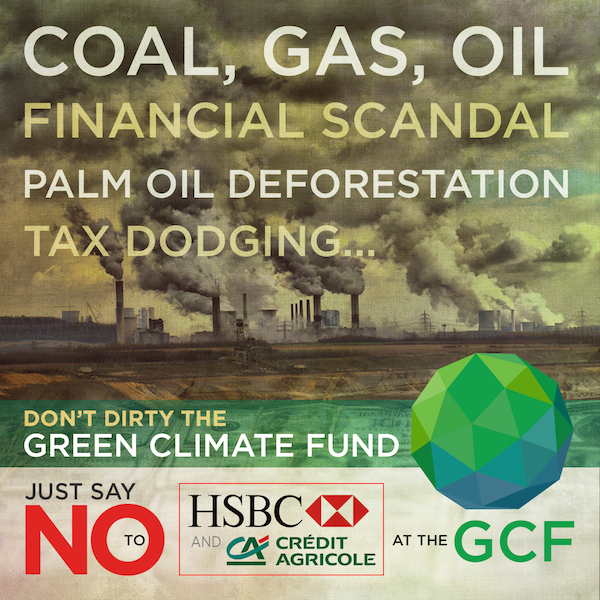
The possible accreditation of HSBC, Crédit Agricole by the Green Climate Fund would jeopardize the reputation of the Fund and expose it to unnecessarily high fiduciary risk as the two firms are not only deeply embroiled in massive financial scandal but are patrons of coal financing.
The above represents the position of about 172 civil society groups released today in Songdo, Korea at the sidelines of a GCF Board Meeting.
In a move similar to its past protests against HSBC, Crédit Agricole’s application at the GCF, the civil society groups are of the view that the Green Climate Fund (GCF) must not channel its money through two scandal-ridden international commercial banks that are leading funders of the coal industry.
The groups say that the GCF must reject applications for accreditation by big banks HSBC and Crédit Agricole. Accredited entities are institutions approved to receive and manage GCF funds.
“The Green Climate Fund Board must reject HSBC and Crédit Agricole. Creating new business for big banks with large fossil fuel portfolios and poor records on human rights and financial scandal would undermine the very purpose of the Fund,” said Karen Orenstein of Friends of the Earth U.S.
“To accredit HSBC and Crédit Agricole is to short-change the vulnerable communities and the countries that the Fund is meant to directly benefit. There is no profit to be made in building the resilience of those adversely impacted by climate change. Public funds must be used to support local communities in developing countries, not to subsidize big banks,” said Sam Ogallah of the Pan African Climate Justice Alliance.
The GCF’s mandate to work directly with developing country institutions is what makes it innovative, the groups say. Targeted funding will help to build skills and expertise in poor countries, allowing governments to better meet the needs of the poorest and most vulnerable people in their countries.

“Accrediting HSBC and Crédit Agricole would be inconsistent with both the Paris Agreement, and with upholding high human rights standards. Any private sector partner of the GCF must have a credible strategy in place to make its entire portfolio and operations consistent with keeping global temperature rise to no more than 2 °C, let alone well below 1.5 °C,” said Annaka Peterson of Oxfam.
A U.S. judge recently ordered the release of a report by an independent monitor overseeing the cleanup of HSBC’s massive money laundering — the report is said to be so damning that it would provide a “road map” for criminals seeking to launder money and finance terrorism.
172 NGOs released a statement calling for the rejection of HSBC and Crédit Agricole by the GCF. A copy of the statement can be found here. Appended to the statement are annexes on the fossil fuel financing trends of HSBC and Crédit Agricole, both of which fail to show a clear downward trend, while their renewables financing trails far behind their fossil fuel financing.











